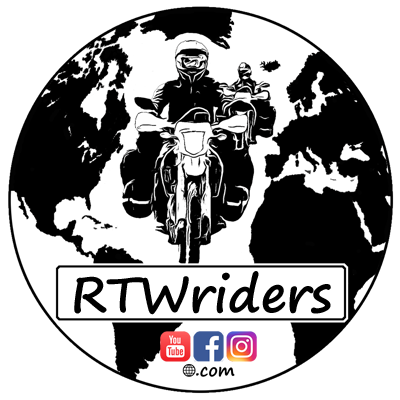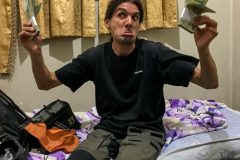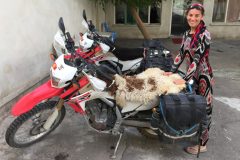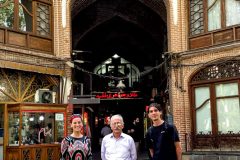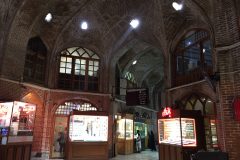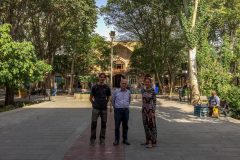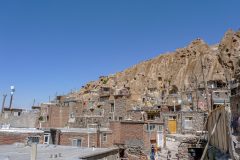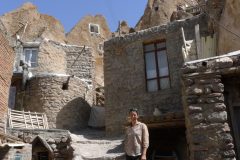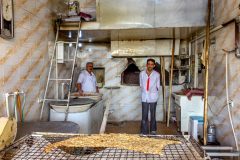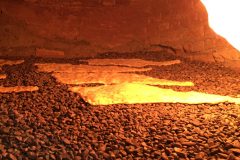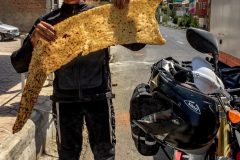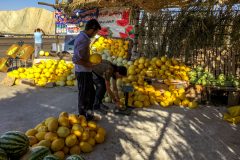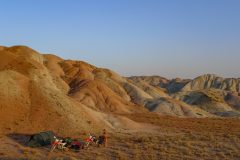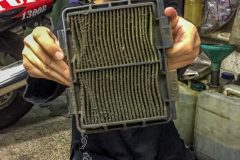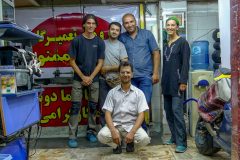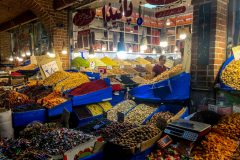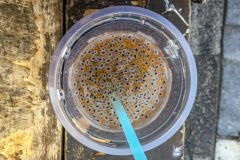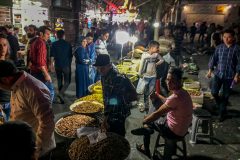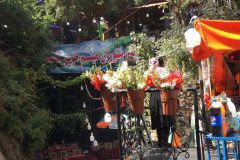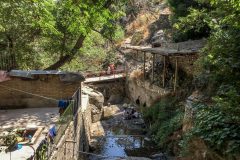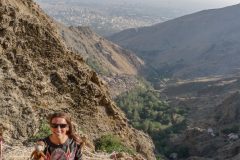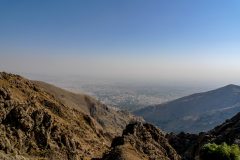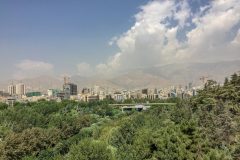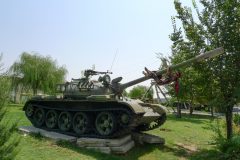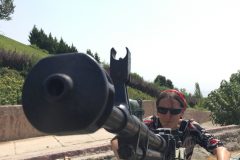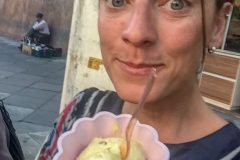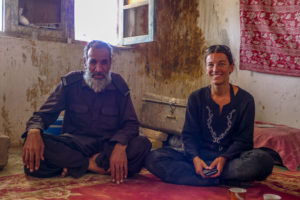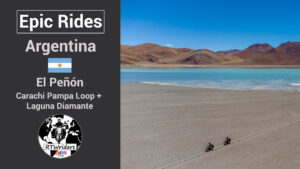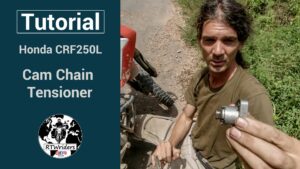Have you ever overtaken a truck with 100km/h (62mi/h) on a highway and suddenly a glass of water is held out to you, as soon as you are at the height of the driver’s cab? You try to make it clear to the driver, that you are on a highway, you are riding pretty fast and it also would be difficult for you to take the glass with your left hand – your right hand is busy with the throttle. The driver understands quickly, his hand disappears back into the driver’s cab, but reappears a few seconds later just to present you a pomegranate. You inevitably have to laugh – the driver has to laugh, too. Welcome to Iran, the friendliest “prison” in the world.
The border on the Azerbaijani side is quite modern. The kid (Miriam) is a bit stroppy and complains that she doesn’t want to wear a “stupid” headscarf and generally – she prefers to just drive quickly through Iran. I skilfully ignore it for a start and let her babble to herself.
We are photographed several times with our motorcycles and are supposed to pay some road tax and insurance. Road tax for just one day and insurance when you leave the country – that’s great. After some back and forth, we can finally convince the customs officer, that we have a green insurance card. He examines it from a distance, but doesn’t even look carefully to check whether it is also valid for Azerbaijan. We don’t pay the road tax either and just act stupid instead, while driving “armed” with a headscarf to the last checkpoint before the Iranian side. They let us pass. Maybe also because they do not feel like discussing with us with poor English skills.
The only thing that interests the Iranian customs officers is alcohol. After they ensured themselves by rummaging around in our luggage, while they were constantly apologising for it, we have already entered Iran – our motorbikes not yet though. Iran is the first country where we need our vehicle ID (Carnet de Passage). We are already aware of that, but unfortunately there is no indication of an office to make custom clearance. Only a few older men offer their services for 20 to 50 US Dollars. We thankfully decline several times.
The offices look like the ones in Germany in the 1970s. Brown furniture and several gentlemen continuously smoke cigarettes and drink tea. After we have been visiting several smoke-filled buildings, they seem to take pity on us and offer us some tea. Afterwards a young man brings us to the right office building, where we get our stamps and are finally allowed to enter the country completely.
At the border town Miriam charges her SIM card and we exchange some money. There are no international ATMs in Iran. That’s why most tourists have to carry US Dollars or Euros. The official exchange rate these days is approximately 42,000 Rials for one Dollar. Due to the US sanctions, the price on the black market at this point in time is around 100,000 Rials for one Dollar. To exchange money, you simply act like a tourist and a short time later a bearded man will almost certainly come up to you and offer his services. Alternatively, you can simply ask any local person to find a “money exchanger” at least as quickly. These people always pull a huge wad of banknotes out of their bags (some of them even have suitcases), you give them some Dollars or Euros and receive a huge wad of Rials in return. Obviously – no receipt, in the middle of the road – sounds weird, but works perfectly fine – that’s how easy it is.
We are on our way to Tabriz. When it gets dark, we first have some dinner at a restaurant and turn into a dirt road afterwards, where we set up our camp for the night in a quarry. It is pretty chilly, we haven’t expected that in Iran.
The next day we reach Tabriz. Miriam negotiates hard with the hotel price and we get a cheap room. We relax for a while and then make our way to the historical bazaar which Tabriz is famous for. We can’t find it straight away, although it is really gigantic. Countless ancient halls and corridors crammed with all imaginable goods. After a short time, you no longer know where you actually came from. So we decide to sit down in a restaurant and order something to eat. Obviously the people working there couldn’t really speak English, so we communicate to the delight of the other guests by miming with our hands and feet. We sit squeezed together between many smacking people, who are all really happy that tourists are dining here and get “thumbs ups” from all sides. Our food comes on plates on a pile of napkin-like something. At first we are not sure, whether it is for cleaning hands or bread to eat. Therefore we curiously watch our neighbours table. Nobody is eating it though – so I just bite off a piece, with the risk of making a fool of myself – nobody starts laughing – it seems to be edible!
After lunch we stroll through the corridors and are approached by an older gentleman, who owns a small antique shop that is just about the size of himself. He shows us some ancient coins and coats of arms and finally wants to show us a bit around in the bazaar. He locks his little shop with a stick and we set off. We steer safely through the bazaar. He shows us the most beautiful corners, the best carpets, how to make bread and where we have to take photos. Then he bought us a cup of tea and said goodbye to return to his shop. On his advice we go to Kandovan the next day.
Kandovan is a kind of a small Turkish Cappadocia. A small place with lots of tourists and apartments in rock formations just outside of Tabriz. We are the only foreign tourists and seem to be the main attraction as we have to take photos with tons of locals. Kandovan is beautiful, but not comparable to Cappadocia. It is also extremely crowded and after a short hike, we rather start our onward journey again.
A few kilometers further we stop at a bakery with fresh bread. They bake us an extra huge “super” bread, that we start to eat while leaning against our motorcycles. More and more questioning faces look at us from the neighbouring shops. A little bit later someone brings us fresh goat cheese and another person provides us with two bottles of Coke. Besides, we should please sit in his repair shop. They probably have been wondering why two stupid tourists are standing on the street devouring simple bread without topping. Unfortunately nobody really speaks English. Therefore the owner calls his wife, who then extensively phones with Miriam. Two different people invite us to their homes. However we have to go to Tehran quickly to apply for our India visas, so we thankfully decline.
On the way to Tehran we use the highway for the first time. In Iran you are not allowed to ride motorcycles larger than 250cc without a special permit. You have to pay a lot of money for a special permit and therefore there are hardly any larger motorcycles in this country. Motorcycles are also not allowed on the motorway – however this law doesn’t include tourists. Since motorcycles are not allowed on the motorways, there are no motorway tolls for them either. Tourists with motorcycles therefore do not have to pay any fees. So you can just friendly wave through the toll booths without paying a penny. This makes travelling by motorcycle particularly fun.
In the afternoon we stop at one of the many melon stands on the roadside. We want to buy a melon for breakfast the next morning. A nice man with a new red jeep comes up to us immediately and wants to inspect our motorcycles. The man is from Azerbaijan and also rides motorcycles. He wants to invite us to a watermelon and so the shopkeeper, the man from Azerbaijan and us are munching together an oversized watermelon. Then we want to buy our breakfast and end up with a large honeydew melon and six cucumbers, which we are not allowed to pay under any circumstances, because the man from Azerbaijan wants to pay for everything. We say goodbye and find a nice spot between some deserted hills for the night.
The next day we reach the capital Tehran. The traffic in Tehran is super chaotic but slow. There are no right of way rules. In a roundabout you drive with maximum momentum and try to find a gap. One-way streets are no reason not to drive in the other direction. In a traffic jam you try to fill every gap with a motorcycle. Wearing a helmet is absolutely uncool, but you can hang it on your motorcycle somewhere or take it for a walk on your lap and zigzag through traffic with one hand, while checking WhatsApp messages or making phone calls. You can also easily drive side by side in heavy traffic, chat with tourists who are trying to concentrate or offer them drinks and other delicacies. So we push ourselves through the chaos, shaking our heads and laughing. However the traffic is mostly slow and once you have adapted to that driving style, it is not that bad anymore. Istanbul felt much more dangerous in comparison.
We find a cheap hotel right in the city centre and can safely park our motorcycles in a private car park for a small fee.
It is weekend and the offices are closed. In Iran, Friday is our European Sunday. However the offices do not work Saturday and Sunday either. Therefore our India visa application has to wait first. We decide to visit one of the numerous motorcycle dealers in town. There is actually only one dealer for large motorcycles in Tehran – Mahak Ciklet. We appear there on foot and are greeted warmly with tea. The next day is unfortunately one of many Iranian public holidays, but they still open especially for us. We need an oil change including an oil filter and urgently new air filters. After more than 25000km and a lot of off-roading in Kyrgyzstan, Tajikistan and Uzbekistan, you can hardly see our air filters anymore due to all the dust. Fortunately the guys there actually have everything in stock. They even check the rest of our motorcycles extremely professionally. During the little test drive, I also notice that my tail light isn’t working anymore. I suddenly also remember, that many thousands of kilometers ago, the kid (also called Miriam) mentioned somewhere in a dark tunnel in Kyrgyzstan, that she was hardly able to see me. For any mysterious reason she didn’t come to the conclusion, that this could be caused by a non-working tail light. Even these thousands of kilometers afterwards, she never noticed anything unusual with my tail lights – thank you Miriam, you are such a great help to me.
Miriam’s gloves have also blessed the time and one of the boys is immediately motivated to find a new pair in the surrounding shops. I get his motorcycle and Miriam on the back and he grabs another bike. I mention in passing, that he should curb his driving style a little bit, because two tourists want to follow him – I find the traffic in Iran sometimes chaotic. He turns around with a grin and then drives over a red light at the next intersection directly in front of a police officer with an “I know”. However shortly afterwards he waits obediently on the roadside for the tourists who have stopped. We have already arrived 200 meters further – great – we could have walked faster to this place.
Everything fixed and with new gloves we finally return to the hotel. Due to the one-way streets, you can only reach our hotel with a longer detour. We therefore decide to simply do it like all the other riders – drive against the direction of travel in “Irani style” – everything goes well – no one cares.
The next day we stroll through the grand bazaar in Tehran. The bazaar is also gigantic. The passages between the individual halls are sometimes provided with struts. We couldn’t find out what these are actually for, but to continue, you inevitably have to squeeze through them. The distance between the struts suggests, that there aren’t that many obese people in Iran. Otherwise it would be really difficult to go shopping in this bazaar. There are all kinds of goodies to try. Two drinks are striking. One looks like fish eggs and the second one like golden beads in water. Both drinks are happily mixed and look really great. The fish eggs are actually soaked basil seeds and the golden beads are called khakshir and consist of the seeds of the London rocket (Sisymbrium irio). Both drinks are made with water, sugar and rose water. There is also a great ice cream with saffron and rose water. It costs almost nothing and we treat ourselves to it almost every day.
Tehran is surrounded by mountains. On sunday we decide to drive to the outskirts and have a look at the Darband district. Darband is in the far north of Tehran and the district ends in a gorge, which gradually meanders up the mountain towards the summit. In the gorge there are many, rather pricey restaurants with employees standing at the entrances to call people into their businesses. It is incredibly crowded and we are finally happy, when we gradually come out of the gorge, where only hikers are left. We meet an older man, who has been hiking this route regularly for 60 years and is happy to accompany us. We are walking with flip-flops since we haven’t planned a hike at all. The way to the summit leads over a via ferrata and the nice gentleman can’t believe it, that two stupid tourists are out here with flip-flops. We have to explain to him several times, that this is all ok and we are not doing this for the first time. He is always very happy whenever other hikers ask us about our somewhat unsuitable footwear, or he even points it out himself. The view is fantastic and it’s nice to be outside of the big city. Unfortunately it is a bit hazy, otherwise you could see whole Tehran.
On Monday we can finally apply for our India Visa. In Tehran this is not done by the Indian embassy, but by a travel agency. The first problem is to find the address. Place and address cannot be precisely identified with Google Maps. With a normal Google search we finally find an office building with a similar address on a different a map. That way we can roughly estimate where the travel agency should be. We decide to take the metro and give the motorbikes a rest. Tehrans metro system is excellent and everything is also written in English. In addition, it is so incredibly cheap that it makes no sense to drive around with your own vehicle. Men and women have separate compartments, but women are also allowed to go into the men’s compartment. The men then immediately jump up and offer the women a seat. Courtesy comes first in Iran. The public bus lines are also separated by gender.
On the way from the metro to the travel agency, we pass the Ab-O-Atash Park and about a dozen tanks that belong to the Holy Defense Museum. They just stand around and you can make some funny photos with them.
We can’t find the travel agency immediately, so we have to ask various people. When we finally arrive on the second floor of the large building, a lot of people are already sitting there waiting for the opening. First of all, you have to put yourself on a list. As soon as the agency opens, a few ladies and gentlemen stroll gradually into their offices and settle down at their workplaces. That takes a while of course – and “already” 45 minutes after the opening, the first customer can be served. In the meantime, slips with queue numbers are distributed to each applicant based on the list. Three women are responsible to handle the applications. There are already over 50 people in the waiting room. Unfortunately, every applicant has to go to each lady. The first one types something into the computer and has to ask the second lady about something all the time. The second then also types something into the computer and partially corrects the first one again. The third is only responsible to cash up. They all don’t really speak English and they are quite surly. We actually ask to be able to pick up our visa at an embassy in an other city on our route to Pakistan. No chance – they don’t send the visa by post and they don’t feel like doing it anyway – muppets!
When Miriam’s application seems to be ready, they send me to the receptionist, who still speaks best English. She then tries to fill out the form for me. After watching what was happening for some time, I asked if I could sit in front of a computer somewhere and briefly fill out the form by myself. There are enough computers – but I’m not allowed to. Half an eternity later the forms are made. Miriam has green eyes, her job is housewife, she is a Christian and I cannot decipher the name of her place of birth. To top it all, our visa application is only for one month, but we want 6 months multiple entry. It doesn’t look much better on Tobis application. We both enter and leave India via Delhi. When we try to mention, that this is nonsense, they just reply “no problem”. After everything has been corrected and partially filled in again, they want to see our Iran visas. Unfortunately they are in our secondary passports, which we had to hand in at the hotel counter. And generally – why the heck do they need our Iran visas to apply for an India visa? So after waiting 8 hours in the travel agency, we have to come back the next day to present our Iran visa.
We finally walk back to the hotel quite disappointed. Tobi is grumpy and would like to choke some muppets. A delicious saffron rose water ice cream helps to lift our mood in the end. The next day in the travel agency we have to wait a long time again. Everything has to be filled out a second time, because our Iran visas are in the other passports. This time we are finished after “only” 6 hours though. The costs for the visas are for any reason extremely cheap at least. Now we have to return in 10 days. Therefore we decide to start a round trip towards the Caspian sea.
